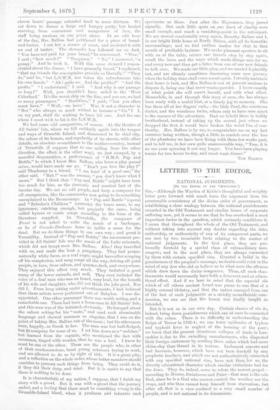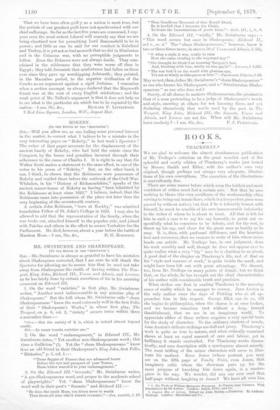LETTERS TO THE EDITOR.
NATIONAL JUD MENTS. go THE Berm OF THE ,,apacreaon.1
Sili,.—Although the Warden of Keble's thoughtful and weighty letter puts forward with much force the argument from the presumable consistency of the divine order of government, as establishing a clear analogy between the national punishments recorded in the Old Testament and similar forms of corporate suffering now, yet it seems to me that he has overlooked a most important factor in the question, which seriously conditions it.
I mean that throughout the whole of the Old Testament, and without taking into account any doubts regarding the date, authorship, or authenticity of any of its component parts, we are met by two invariable facts relating to the matter of national judgments. In the first place, they are pro- fessedly foretold by a special class of extraordinary mes- sengers; and in the next place, they are always connected by them with certain specified sins. Granted a belief in the genuineness of the prophet's message, no doubt could exist in the mind of any Jew who did so believe as to what were the offences which drew down the divine vengeance. Thus, all such chas-
tisements would necessarily have both a deterrent and an educa- tional effect. And if we bear in mind that the especial sin which of all others ancient Israel was prone to was that of a highly sensual idolatry, and. that the nation emerged from one of the last of such judgments as a strictly monotheistic com- munion, we can see that the lesson was finally taught as intended.
But it is not so in our own day. Certain classes of sin do, indeed, bring down punishments which can at once be connected with the crime. There is no difficulty in understanding the Reign of Terror in 1792-4; we can trace epidemics of typhus and typhoid fever to neglect of the housing of the poor ;
we know that the present disastrous collapse of trade in Lan-
cashire is duo to the swindling inauufaeturers, who disgusted their foreign customers by sending them calico which had more china-clay than thread in its texture. Inclement seasons and bad , harvests, however, which have not been foretold by any prophetic teachers, and which are not authoritatively connected with any specified national Sins, have •not thus, for us, the
directly educational character which similar visitations had for the Jews. They do, indeed, serve to refute the newest gospel— according to Messrs. Swinburne and Pater—that man is the sole God, since he is a God who cannot control the weather nor the crops, and who thus cannot keep himself from starvation; but after all, that is a view confined to a very small number of people, and is not national in its dimensions.
That we have been often guiP y as a nation is most true, but the periods of our greatest guilt have not synchronised with our chief sufferings. So far as the last five years are concerned, I sup- pose even the most ardent Liberal will scarcely say that we are being chastised now for permitting Lord Beaconsfield to be in power ; and little as can be said for our conduct in Zululand and Turkey, it is yet not so bad as much that we did in Hindostan and in the Crimean war, with no perceptible judgments to follow. Even the Hebrews were not always docile. They com- plained in the wilderness that they were worse off than in Egypt; they told. Jeremiah that misfortunes had fallen on them ever since they gave up worshipping Ashtoreth; they pointed, in the Maccabee period, to the superior civilisation of the Greeks as an argument against a rigid Judaism. I remember when a section amongst us always declared that the Maynooth Grant was at the root of every English misfortune ; and the weak point of Mr. Talbot's argument is that it does not help us to see what is the particular sin which has to be expiated by the































 Previous page
Previous page